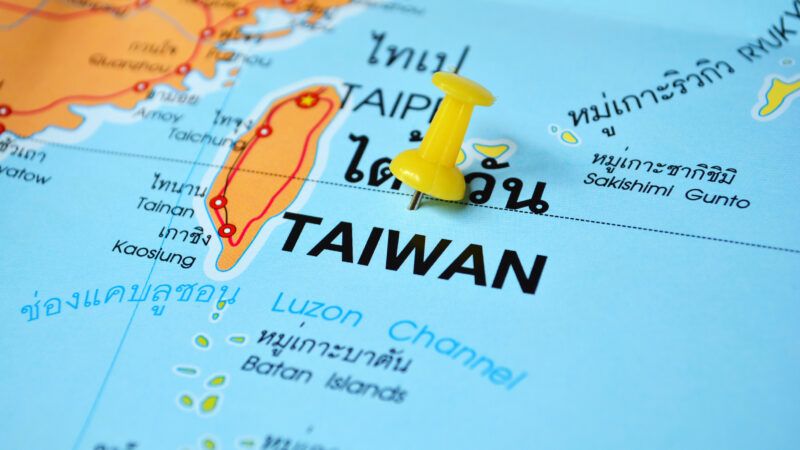What Would It Mean for Taiwan's President To Visit the White House?
It may be a good idea in theory, but it's probably an impractical pipe dream.

Presidents of Taiwan have visited the U.S. 29 times since the first visit in 1994, the most recent being current President Tsai Ing-wen's visit to New York City and Los Angeles in the spring of this year. However, no Taiwanese president has ever visited the White House.
A few weeks after U.S. Secretary of State Anthony Blinken reaffirmed U.S. support for the "one China" policy, Lai Ching-te, vice president of Taiwan and presidential candidate for the Democratic Progressive Party (DPP), announced that a White House visit would be a symbolic measure of Taiwan's progress toward further autonomy.
"When the president of Taiwan can enter the White House, the political goal we are pursuing will have been achieved," Lai told a group of supporters on July 10.
Only 13 countries, most of which are small island nations, officially recognize Taiwan's government. The U.S. has had unofficial relations with Taiwan, officially the Republic of China, since 1979, when it withdrew its recognition in favor of Mainland China, officially the People's Republic of China. The one China policy was established by the 1972 Shanghai Communiqué, which claimed "that all Chinese on either side of the Taiwan Strait maintain there is but one China and that Taiwan is a part of China."
The Biden administration has hosted leaders from other Asian democracies, including Japan and South Korea, and even plans to host Israeli Prime Minister Benjamin Netanyahu, who has faced criticism for controversial judicial reforms.
"It's the goal of any head of state, president, or other government leaders to be able to walk in the halls of the White House," says Thomas Shattuck, manager of the Global Order program at the University of Pennsylvania's Perry World House. "But when you put these comments in a Taiwan context, then obviously it becomes somewhat controversial or newsworthy because Taiwan's president is not able to do that."
Lai's goal of visiting the White House aligns with his vision of preserving peace in the Taiwan Strait, which emphasizes building diplomatic relations with democracies. "The third pillar is based on forming partnerships with democracies around the world," wrote Lai in The Wall Street Journal. "Record numbers of parliamentarians, nongovernmental organizations, think tanks and official delegations have visited Taiwan, showing that despite Communist Party pressure, we do not stand alone."
Lai has used strong rhetoric about the autonomy of Taiwan's foreign relations in the past. In a January press conference, he called himself a "pragmatic worker for Taiwan independence" but clarified that this stance doesn't deviate from Taiwan's current arrangement with China. "I would like to reiterate that Taiwan is already an independent and sovereign nation and thus we do not have a need to further declare Taiwan independence," he noted.
The island of Taiwan is a sovereign democracy with a substantial degree of economic freedom that many world powers formerly treat as a disputed territory belonging to Mainland China.
"This would be an undeniable acknowledgment of Taiwan's sovereignty, even in the absence of formally reestablishing diplomatic relations. A U.S. president open to such a meeting would signal that relations with the fellow democracy are worth the inevitable greater conflict with China it would bring," explains Timothy Rich, director of the International Public Opinion Lab at Western Kentucky University. "From the Taiwanese perspective, this would also be the end of the decades of isolation, of being treated as second-class, as not a sovereign equal."
"The upsides to high-level exchanges between the United States and Taiwan are firstly that it [is] an important demonstration [of] US leadership in supporting a democratic ally and for countering China's persistent efforts to isolate Taiwan and its leaders internationally," says Russell Hsiao, executive director of the Global Taiwan Institute.
But the potential for conflict between the U.S. and China has made U.S. policy makers wary of hosting this type of visit. It could put both Taiwan and the U.S. at risk, especially since the U.S. plans to defend Taiwan militarily in an invasion.
"A formal diplomatic visit, however, would immediately worsen U.S. relations with China and would likely be interpreted as an intention to keep Taiwan separate from China permanently, [an] act that could result in military conflict," says Rich. "Unfortunately, I cannot imagine a situation in which a U.S. president would welcome such a diplomatic visit while the current regime is in power in China."
When former Speaker of the House Nancy Pelosi visited Taiwan last August, China responded with a comprehensive military demonstration that included warplane and warship maneuvers across the median line and ballistic missile strikes that landed in Taiwan's waters.
"This move seriously violates the one-China principle, maliciously infringes on China's sovereignty and blatantly engages in political provocations, which has aroused strong indignation among the Chinese people and widespread opposition from the international community," said Chinese Foreign Minister Wang Yi regarding the visit.
Because of China's aggression, the Taiwanese people don't seem to be as enthusiastic about diplomatic visits as their politicians. According to a January survey by the Brookings Institute, 62 percent of respondents said that Pelosi's visit "made Taiwan less secure."
A Taiwan presidential visit to the White House is a commendable goal but remains impractical unless the threat of a Chinese invasion wanes.

Show Comments (31)